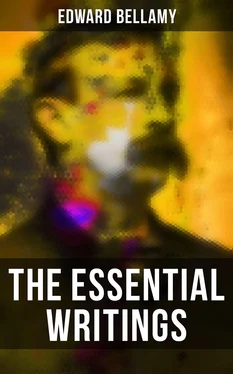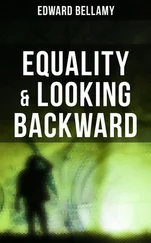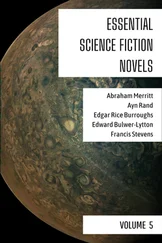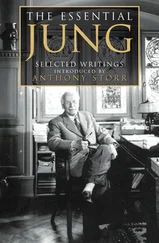“Do you ask what we look for when unnumbered generations shall have passed away? I answer, the way stretches far before us, but the end is lost in light. For twofold is the return of man to God ‘who is our home,’ the return of the individual by the way of death, and the return of the race by the fulfillment of the evolution, when the divine secret hidden in the germ shall be perfectly unfolded. With a tear for the dark past, turn we then to the dazzling future, and, veiling our eyes, press forward. The long and weary winter of the race is ended. Its summer has begun. Humanity has burst the chrysalis. The heavens are before it.”
Table of Contents
I never could tell just why, but Sunday afternoon during my old life had been a time when I was peculiarly subject to melancholy, when the color unaccountably faded out of all the aspects of life, and everything appeared pathetically uninteresting. The hours, which in general were wont to bear me easily on their wings, lost the power of flight, and toward the close of the day, drooping quite to earth, had fairly to be dragged along by main strength. Perhaps it was partly owing to the established association of ideas that, despite the utter change in my circumstances, I fell into a state of profound depression on the afternoon of this my first Sunday in the twentieth century.
It was not, however, on the present occasion a depression without specific cause, the mere vague melancholy I have spoken of, but a sentiment suggested and certainly quite justified by my position. The sermon of Mr. Barton, with its constant implication of the vast moral gap between the century to which I belonged and that in which I found myself, had had an effect strongly to accentuate my sense of loneliness in it. Considerately and philosophically as he had spoken, his words could scarcely have failed to leave upon my mind a strong impression of the mingled pity, curiosity, and aversion which I, as a representative of an abhorred epoch, must excite in all around me.
The extraordinary kindness with which I had been treated by Dr. Leete and his family, and especially the goodness of Edith, had hitherto prevented my fully realizing that their real sentiment toward me must necessarily be that of the whole generation to which they belonged. The recognition of this, as regarded Dr. Leete and his amiable wife, however painful, I might have endured, but the conviction that Edith must share their feeling was more than I could bear.
The crushing effect with which this belated perception of a fact so obvious came to me opened my eyes fully to something which perhaps the reader has already suspected — I loved Edith.
Was it strange that I did? The affecting occasion on which our intimacy had begun, when her hands had drawn me out of the whirlpool of madness; the fact that her sympathy was the vital breath which had set me up in this new life and enabled me to support it; my habit of looking to her as the mediator between me and the world around in a sense that even her father was not — these were circumstances that had predetermined a result which her remarkable loveliness of person and disposition would alone have accounted for. It was quite inevitable that she should have come to seem to me, in a sense quite different from the usual experience of lovers, the only woman in this world. Now that I had become suddenly sensible of the fatuity of the hopes I had begun to cherish, I suffered not merely what another lover might, but in addition a desolate loneliness, an utter forlornness, such as no other lover, however unhappy, could have felt.
My hosts evidently saw that I was depressed in spirits, and did their best to divert me. Edith especially, I could see, was distressed for me, but according to the usual perversity of lovers, having once been so mad as to dream of receiving something more from her, there was no longer any virtue for me in a kindness that I knew was only sympathy.
Toward nightfall, after secluding myself in my room most of the afternoon, I went into the garden to walk about. The day was overcast, with an autumnal flavor in the warm, still air. Finding myself near the excavation, I entered the subterranean chamber and sat down there. “This,” I muttered to myself, “is the only home I have. Let me stay here, and not go forth any more.” Seeking aid from the familiar surroundings, I endeavored to find a sad sort of consolation in reviving the past and summoning up the forms and faces that were about me in my former life. It was in vain. There was no longer any life in them. For nearly one hundred years the stars had been looking down on Edith Bartlett’s grave, and the graves of all my generation.
The past was dead, crushed beneath a century’s weight, and from the present I was shut out. There was no place for me anywhere. I was neither dead nor properly alive.
“Forgive me for following you.”
I looked up. Edith stood in the door of the subterranean room, regarding me smilingly, but with eyes full of sympathetic distress.
“Send me away if I am intruding on you,” she said; “but we saw that you were out of spirits, and you know you promised to let me know if that were so. You have not kept your word.”
I rose and came to the door, trying to smile, but making, I fancy, rather sorry work of it, for the sight of her loveliness brought home to me the more poignantly the cause of my wretchedness.
“I was feeling a little lonely, that is all,” I said. “Has it never occurred to you that my position is so much more utterly alone than any human being’s ever was before that a new word is really needed to describe it?”
“Oh, you must not talk that way — you must not let yourself feel that way — you must not!” she exclaimed, with moistened eyes. “Are we not your friends? It is your own fault if you will not let us be. You need not be lonely.”
“You are good to me beyond my power of understanding,” I said, “but don’t you suppose that I know it is pity merely, sweet pity, but pity only. I should be a fool not to know that I cannot seem to you as other men of your own generation do, but as some strange uncanny being, a stranded creature of an unknown sea, whose forlornness touches your compassion despite its grotesqueness. I have been so foolish, you were so kind, as to almost forget that this must needs be so, and to fancy I might in time become naturalized, as we used to say, in this age, so as to feel like one of you and to seem to you like the other men about you. But Mr. Barton’s sermon taught me how vain such a fancy is, how great the gulf between us must seem to you.”
“Oh that miserable sermon!” she exclaimed, fairly crying now in her sympathy, “I wanted you not to hear it. What does he know of you? He has read in old musty books about your times, that is all. What do you care about him, to let yourself be vexed by anything he said? Isn’t it anything to you, that we who know you feel differently? Don’t you care more about what we think of you than what he does who never saw you? Oh, Mr. West! you don’t know, you can’t think, how it makes me feel to see you so forlorn. I can’t have it so. What can I say to you? How can I convince you how different our feeling for you is from what you think?”
As before, in that other crisis of my fate when she had come to me, she extended her hands toward me in a gesture of helpfulness, and, as then, I caught and held them in my own; her bosom heaved with strong emotion, and little tremors in the fingers which I clasped emphasized the depth of her feeling. In her face, pity contended in a sort of divine spite against the obstacles which reduced it to impotence. Womanly compassion surely never wore a guise more lovely.
Such beauty and such goodness quite melted me, and it seemed that the only fitting response I could make was to tell her just the truth. Of course I had not a spark of hope, but on the other hand I had no fear that she would be angry. She was too pitiful for that. So I said presently, “It is very ungrateful in me not to be satisfied with such kindness as you have shown me, and are showing me now. But are you so blind as not to see why they are not enough to make me happy? Don’t you see that it is because I have been mad enough to love you?”
Читать дальше












